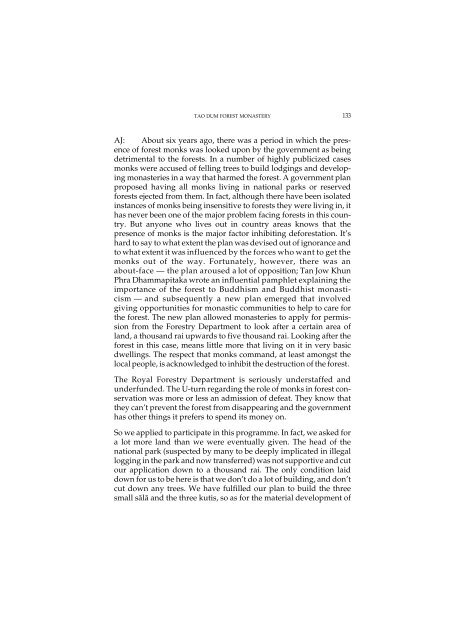Forest Path - Amaravati Buddhist Monastery
Forest Path - Amaravati Buddhist Monastery
Forest Path - Amaravati Buddhist Monastery
You also want an ePaper? Increase the reach of your titles
YUMPU automatically turns print PDFs into web optimized ePapers that Google loves.
tao dum forest monastery 133<br />
AJ: About six years ago, there was a period in which the presence<br />
of forest monks was looked upon by the government as being<br />
detrimental to the forests. In a number of highly publicized cases<br />
monks were accused of felling trees to build lodgings and developing<br />
monasteries in a way that harmed the forest. A government plan<br />
proposed having all monks living in national parks or reserved<br />
forests ejected from them. In fact, although there have been isolated<br />
instances of monks being insensitive to forests they were living in, it<br />
has never been one of the major problem facing forests in this country.<br />
But anyone who lives out in country areas knows that the<br />
presence of monks is the major factor inhibiting deforestation. It’s<br />
hard to say to what extent the plan was devised out of ignorance and<br />
to what extent it was influenced by the forces who want to get the<br />
monks out of the way. Fortunately, however, there was an<br />
about-face — the plan aroused a lot of opposition; Tan Jow Khun<br />
Phra Dhammapitaka wrote an influential pamphlet explaining the<br />
importance of the forest to Buddhism and <strong>Buddhist</strong> monasticism<br />
— and subsequently a new plan emerged that involved<br />
giving opportunities for monastic communities to help to care for<br />
the forest. The new plan allowed monasteries to apply for permission<br />
from the <strong>Forest</strong>ry Department to look after a certain area of<br />
land, a thousand rai upwards to five thousand rai. Looking after the<br />
forest in this case, means little more that living on it in very basic<br />
dwellings. The respect that monks command, at least amongst the<br />
local people, is acknowledged to inhibit the destruction of the forest.<br />
The Royal <strong>Forest</strong>ry Department is seriously understaffed and<br />
underfunded. The U-turn regarding the role of monks in forest conservation<br />
was more or less an admission of defeat. They know that<br />
they can’t prevent the forest from disappearing and the government<br />
has other things it prefers to spend its money on.<br />
So we applied to participate in this programme. In fact, we asked for<br />
a lot more land than we were eventually given. The head of the<br />
national park (suspected by many to be deeply implicated in illegal<br />
logging in the park and now transferred) was not supportive and cut<br />
our application down to a thousand rai. The only condition laid<br />
down for us to be here is that we don’t do a lot of building, and don’t<br />
cut down any trees. We have fulfilled our plan to build the three<br />
small sàlà and the three kutis, so as for the material development of

















